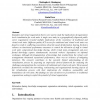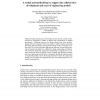25 search results - page 3 / 5 » Utilising Task-Patterns in Organisational Process Knowledge ... |
ICSE
2008
IEEE-ACM
14 years 5 months ago
2008
IEEE-ACM
Management of architectural knowledge is vital for improving an organisation's capabilities in software architecture. Recently, there have been many efforts to develop variou...
ECIS
2003
13 years 7 months ago
2003
Boundary and virtual organisation theory were used to study the implications of organisation level virtualisation for work units. A single case study in a geographically dispersed...
IJKL
2010
13 years 11 days ago
2010
: For todays organisations to obtain competitive advantages, online corporate Communities of Practice (CoPs) are indispensable. However, often the majority of its participants does...
DEXA
2003
Springer
13 years 10 months ago
2003
Springer
Abstract. Engineering design is a knowledge intensive activity. Design is characterized as comprising a number of phases from requirements to detailed specification. Transitions be...
HICSS
2000
IEEE
13 years 10 months ago
2000
IEEE
People are able to determine whether or not a given document is interesting just by glancing through it. However, when asked to make explicit the rules upon which such a decision ...


